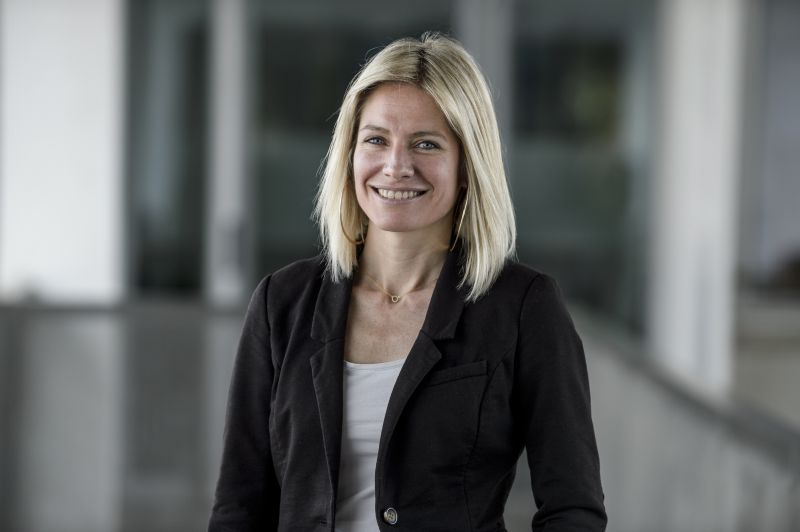Stéphanie Le Maitre completed her thesis in 2009 at AMSE. Back then, she was already passionate about environmental issues. After rising through the ranks, she is now Coordinator of the Energy Transition Unit at the French Agency for Ecological Transition (ADEME) in Provence-Alpes-Côte d’Azur.
CAN YOU DESCRIBE YOUR CAREER TRAJECTORY SINCE YOUR TIME AT AMSE?
I completed my PhD thesis in 2009 under the supervision of Antoine Soubeyran and Hubert Stahn. The subject was «Household waste management : from consumer to citizen between constraint and persuasion». The year before, I had done a gap year and worked in the sustainable development department of Dexia Bank, in the La Défense (Paris). I came back and finished my thesis, but I realised that I wanted to leave the world of research and work in business.
I sent my CV to recruitment agencies, and one of them offered me a job as a waste engineer, echoing the subject of my thesis. The job was at ADEME’s Franche-Comté Regional Office. I was taken on at ADEME a fortnight before I defended my thesis. But it was really my thesis and the subject it explored that gave me the chance to work for ADEME, which only recruited PhDs or people from an engineering school background.
ADEME is a national body but operates at regional level to support local players. At national level, the agency works with ministries to implement priority policies. This provides a framework for the regional divisions. At regional level, ADEME helps local authorities, businesses and associations develop their skills, raise awareness and meet the challenges of energy and ecological transition, and offers technical and financial support.
Until 2014, I worked in Besançon on the theme of circular economy and waste. The aim was to reduce the production of waste, both by private individuals and by businesses and industry, and to improve sorting, recovery and recycling. My work was wide-ranging, from setting up awarenessraising programmes aimed at changing behaviour to funding sorting centres, composting plants, recycling plants or reusing and recycling centres.
I then joined the Provence-Alpes-Côte d’Azur Regional Department as an engineer working on building issues. I was involved in setting up and running the network of «energy renovation platforms», the forerunner of the public service France Rénov’. At the same time, I was helping building professionals (design offices, architects, construction companies) to develop their skills in sustainable construction and renovation, while taking into account the specific characteristics of the Mediterranean. For example, when it comes to summer comfort, the challenge is to build a home without having to install an air-conditioning unit, which means orienting the building properly, insulating it well, planting vegetation, and so on.
In 2018, the subject of hydrogen came up. Hydrogen is widely used in industry, for instance to refine oil or produce fertiliser. The problem is that it is produced from fossil fuels (gas and coal) and the technologies used to produce it are polluting. One of the challenges facing the decarbonising industry is therefore to replace this carbon-based hydrogen with decarbonised hydrogen, i.e. to use a less polluting technology (electrolysers).
Another application for hydrogen is in the decarbonisation of heavy mobility applications (HGVs, coaches, trains). My role has been to support the construction of «hydrogen ecosystems», i.e. consortia of partners involved in the entire chain : some produce low-carbon or renewable hydrogen, others distribute it and still others use it.
WHAT ARE YOU WORKING ON CURRENTLY?
Since January 2023, I’ve been coordinating the Energy Transition Unit at the PACA Regional Division. So I’m back working on building, hydrogen, decarbonisation of industry and discovering renewable heat. I coordinate eight engineers. I also look after the budgets, which are substantial at ADEME (€35 million for the PACA Regional Office, between €15 and €25 million for the Energy Transition Unit). As I want to keep one foot on the ground and support projects, I continue to supervise those that produce renewable heat from biomass.
Project support involves raising awareness of the issues at stake and presenting all the financial aid schemes that can be put in place to assist project leaders. It also means putting people in touch with each other, because a local authority does not necessarily know all companies or associations in the area. We put people in touch with each other so that partnerships can be created, and we support them in setting up their projects. ADEME co-finances projects with other institutions such as departmental councils and regional councils, as well as banks, notably the Banque Publique d’Investissement (BPI) and the Banque des Territoires , which often share our areas of activity. What I love about my work is the diversity. The diversity of subjects first of all : ADEME covers a vast range of issues relating to ecological transition. And the diversity of roles: at times, I’m in the position of ‘communicator’ or ‘commercial manager’ raising awareness and convincing people, ‘analyst’ or ‘advisor’ having to set up a project and meet potential partners, or ‘administrator’ when drawing up an aid agreement. And since the start of the year, I’ve also been wearing a ‘manager’s’ hat, which gives me a whole new angle on the job.
HOW DO YOU FEEL ABOUT YOUR TIME AT AMSE?
Doing a PhD was extremely formative. Antoine Soubeyran was one of my Master professors, he wanted to work on an environmental issue, which immediately appealed to me. The PhD taught me how to conduct effective research, open up the field of possibilities, be patient and persevering and present my work. During my thesis, I gave classes and learnt how to transfer knowledge, which I still use today. And I was lucky enough to have two thesis co-directors who managed to support me while taking my wishes into account.

→ This article was issued in AMSE Newletter, Winter 2023.
© Photo by ADEME






